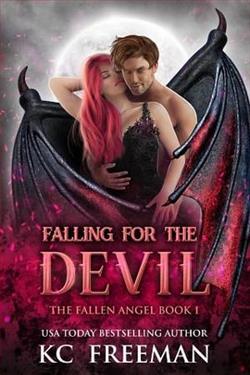Summary

Falling for the Devil
by K.C. Freeman
What if everything we thought we knew about the fall of the most notorious archangel from history was wrong?
Archangel Lucifer has been tasked with avenging slaughtered angels; but in so doing must face his greatest challenge--unbridled temptation. Only ever wanting to be the dutiful son, all things change when he comes face to face with the virgin Goddess of the Hunt.
The young goddess wants to become a warrior like her brothers. She finally gets the chance when the Creator himself requests her help on a hunt for an angel killer.
Adventure awaits them both as they face many unexpected perils along the way to justice, but the true danger lies closer within... to the desire that once ignited in their hearts could change the course of history in the cosmos forever.
.
Read
Falling for the Devil on http://kissnovel.net
Martial Peak Reviews
K.C. Freeman's Falling for the Devil is a captivating reimagining of the mythos surrounding one of history's most infamous figures: Lucifer, the fallen archangel. The novel delves into themes of temptation, duty, and the complexities of desire, all while weaving a narrative that is both adventurous and deeply introspective. Freeman's storytelling invites readers to reconsider the traditional narratives surrounding good and evil, offering a fresh perspective on the characters we thought we knew.
The story begins with Lucifer, an archangel tasked with avenging the slaughter of his fellow angels. This premise sets the stage for a tale steeped in conflict, not just external but internal as well. Lucifer's journey is marked by his struggle between his duty to the Creator and the burgeoning feelings he develops for the young Goddess of the Hunt. This duality is a central theme in the book, as it explores the tension between obligation and personal desire. Freeman skillfully portrays Lucifer as a character who is torn between his role as a dutiful son and the allure of temptation, making him relatable and complex.
The introduction of the Goddess of the Hunt adds another layer to the narrative. She is portrayed as a fierce and determined character, eager to prove herself in a world dominated by her brothers. Her desire to become a warrior mirrors Lucifer's own struggles, creating a dynamic that is both compelling and fraught with tension. The chemistry between the two characters is palpable, and Freeman does an excellent job of building their relationship throughout the story. As they embark on their quest to hunt down the angel killer, their interactions are charged with an undercurrent of desire that complicates their mission and ultimately leads to profound consequences.
Freeman's world-building is another standout aspect of Falling for the Devil. The author crafts a richly detailed universe that feels both familiar and innovative. The celestial realms are vividly described, and the lore surrounding the characters is intricately woven into the narrative. This attention to detail enhances the reader's immersion in the story, allowing them to fully appreciate the stakes involved in Lucifer and the Goddess's quest. The author’s ability to blend mythological elements with original storytelling is commendable, as it invites readers to engage with the material on a deeper level.
One of the most intriguing aspects of the novel is its exploration of morality and the nature of good and evil. Freeman challenges the reader to reconsider preconceived notions about these concepts, particularly through the character of Lucifer. Traditionally viewed as the embodiment of evil, the archangel is presented here as a tragic figure, grappling with his identity and the choices that define him. This nuanced portrayal encourages readers to reflect on the complexities of morality, suggesting that the line between good and evil is often blurred.
The pacing of the novel is well-executed, balancing moments of action with introspective character development. The adventure unfolds at a steady rhythm, with each peril they face serving to deepen the bond between Lucifer and the Goddess. Freeman's writing is engaging and fluid, making it easy for readers to become invested in the characters' journey. The dialogue is sharp and often laced with wit, adding a layer of enjoyment to the reading experience.
As the narrative progresses, the stakes become increasingly high, culminating in a climax that is both thrilling and emotionally charged. The choices made by the characters have far-reaching implications, not only for themselves but for the cosmos as a whole. This sense of urgency propels the story forward, keeping readers on the edge of their seats as they anticipate the outcome of the characters' struggles.
In comparison to other works that explore similar themes, such as Neil Gaiman's American Gods or Philip Pullman's His Dark Materials, Falling for the Devil stands out for its focus on the personal journey of its characters. While Gaiman and Pullman delve into broader societal and philosophical questions, Freeman's narrative is more intimate, centering on the emotional and relational dynamics between Lucifer and the Goddess. This focus allows for a deeper exploration of the characters' motivations and desires, making their journey all the more impactful.
Overall, K.C. Freeman's Falling for the Devil is a thought-provoking and engaging read that challenges traditional narratives surrounding angels and demons. With its rich character development, intricate world-building, and exploration of complex themes, the novel leaves a lasting impression. Readers will find themselves questioning their own beliefs about morality and the nature of desire, all while being swept away by an adventure that is as thrilling as it is poignant. This book is a must-read for anyone interested in a fresh take on mythological tales and the eternal struggle between duty and desire.
























Reviews 0
Post a Reviews: